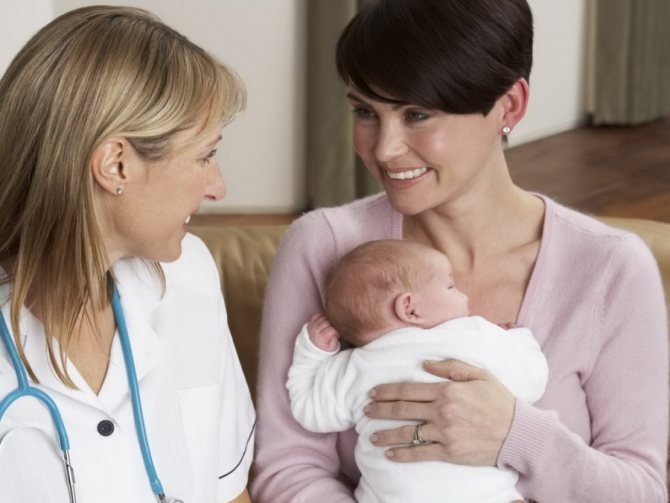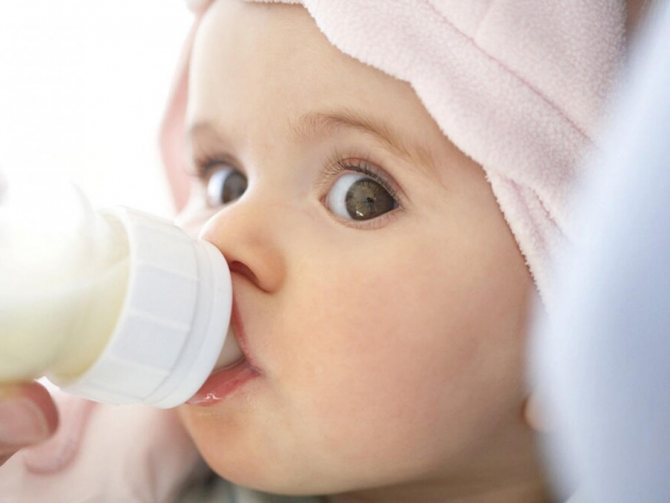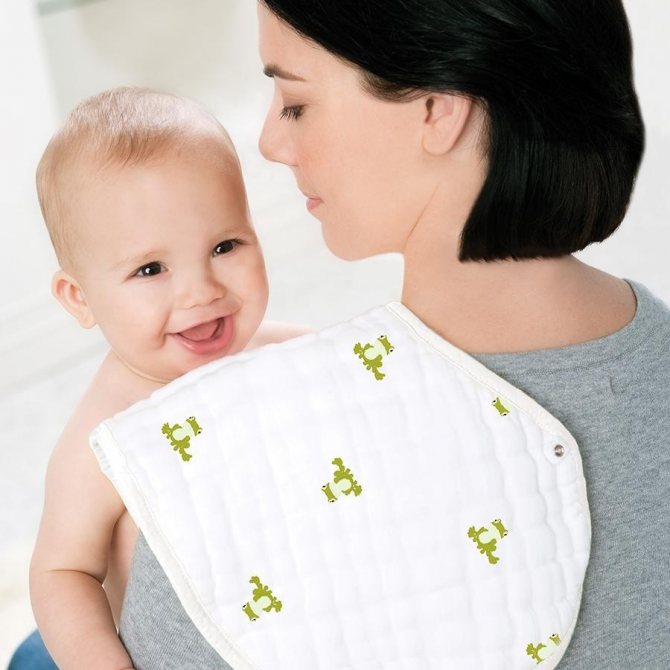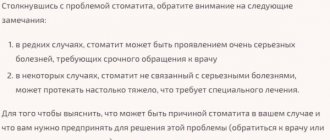What are the main causes of regurgitation?
Most often in infants these are anatomical features of the gastrointestinal tract. The sphincter between the esophagus and stomach in an infant is not as pronounced as in an adult and is closed by a different mechanism. It consists of petal-like folds of the lining of the stomach that form a valve. This area does not shrink, as in adults, preventing food from returning from the stomach. In young children, this hole is constantly half-open. Thus, when a child lies in a crib and the outlet of the stomach is located higher than the inlet, food is thrown out of it, as if from an open bottle.
Causes of regurgitation
Regurgitation is the expulsion of milk or formula from the stomach. There may be several reasons for this feature. Let's consider the main ones:
- In most cases, the cause of regurgitation is overeating.
- If the baby has consumed a large amount of milk or formula, the excess food comes out through the mouth.
- If a child has difficulty defecating or intestinal colic, the normal passage of food is disrupted, as a result of which the child may vomit.
- If, along with eating, the child swallows air, then regurgitation will definitely occur. The cause of this incident is improper attachment of the baby to the breast.
- Regurgitation can occur due to an underdeveloped sphincter, and this is not a pathology. Normal functioning of the sphincter occurs closer to one year.
- If immediately after feeding you play active games with your baby, turn him on his tummy or on his side, then regurgitation cannot be avoided.
The above reasons for regurgitation are features of the baby’s physiology and are considered the norm. The cause of regurgitation can also be pathology of the digestive tract or central nervous system.
It should be noted that not only newborns are prone to regurgitation; regurgitation in a one-month-old baby is also considered normal.
How to distinguish regurgitation from vomiting?
Normally, a child burps, as a rule, not profusely and not often. At the same time, his general well-being is not disturbed. He is still cheerful, active, playful, his skin color does not change. Unlike normal regurgitation, vomiting is a rather complex reflex act in which the contents of the stomach are expelled in the same way, but the abdominal muscles and diaphragm are involved. In young children, vomiting is also accompanied by disturbances in breathing and heartbeat. Thus, regurgitation is a physiological condition for some children, vomiting is a dangerous symptom. However, to distinguish one from the other, it is better to consult a pediatrician.
What to do if your baby spits up through the nose
Perhaps every mother has encountered such a nuisance when a child spits up through the nose. What to do in such a situation? Firstly, it should be noted that regurgitation is a natural process in infants, however, you must admit, it is not pleasant when a child burps through the nose. And the point is not at all that you have to change the baby’s clothes again and not forget to change your clothes yourself.
Almost all babies spit up after some feedings, whether they are breastfed or bottle-fed. For a healthy baby who is gaining weight well and peeing well in cloth diapers or disposables and pooping at least 3 times a day, for babies over 6 weeks, sparser stools are normal, spitting up is more of a laundry problem than a medical one.
.
VIDEO ON THE TOPIC: Baby spits up after feeding, what to do?
Antireflux mechanism in children
In children, the nervous regulation of the antireflux mechanism is very complex and is easily disrupted under the influence of external and internal factors. Regurgitation and vomiting easily occur in children with an immature antireflux mechanism if the feeding regimen or volume is incorrectly selected, as a reaction to artificial formula, at the slightest sign of infectious processes. This is especially often observed in children with intrauterine growth retardation and premature births, as well as in severe pregnancy and toxicosis, cesarean section, complicated childbirth, etc.
Reasons for spitting up formula
Many parents ask the question: “What to do if the child spits up too often?” In this case, if you are feeding your baby with formula, you need to check the formula - the baby probably has an allergic reaction to some component.

Another reason could be incorrect dosage. Some mothers forget to adjust the amount of formula taking into account the time of day and the child’s well-being. As a result of this, the baby overeats.

Belching can also be caused by gases accumulated in the intestines. In such a situation, fennel-based preparations will help.

When to see a doctor
Despite the fact that moderate regurgitation in a child under 6 months is considered normal, parents must tell their pediatrician about this during a routine examination. Causes for serious concern and immediate examination of the child are an increase in the frequency or volume of regurgitation, the appearance of blood streaks or bile impurities, a lag in weight gain or weight loss, and a high temperature. In this case, it is necessary to urgently consult a surgeon to exclude surgical causes.
How to distinguish vomiting from regurgitation
Many mothers turn to the doctor to understand how to distinguish vomiting from regurgitation - after all, it is not so easy to do. Experts say that the following factors are present when vomiting:
- Before rejecting the eaten food, the child cries.
- If the child is older than 1 year, and regular regurgitation continues.
- In addition to regurgitation, the child has an elevated temperature/disordered stool/abdominal pain.
- The baby's weight does not increase.
- Vomiting is often carried out through the nose, and regurgitation is carried out exclusively through the mouth.
- After regurgitation, the child begins to hiccup; after vomiting, this feature is absent.
If your child regularly regurgitates the above factors, be sure to consult a doctor to rule out possible pathologies.
When is regurgitation a dangerous symptom?
There are a number of diseases in which regurgitation is a pathological, dangerous symptom. First of all, these are diseases such as pyloric stenosis and pylorospasm. In the place separating the stomach and duodenum, there is a sphincter, as at the entrance to the esophagus. When the food is sufficiently prepared in the stomach, it opens, pushing it into the duodenum. With pylorospasm, a spasm of this sphincter occurs, and food is not completely removed from the stomach. With pyloric stenosis, food is not excreted almost completely. In both cases, when feeding the baby, the stomach becomes full, since it has not yet gotten rid of the remnants of the previous feeding, and the baby begins to spit up. In these cases, regurgitation is profuse, often has a cheesy consistency and a sour smell.
Typically, these diseases appear around the 2-4th week of a child’s life. If pyloric spasm can be overcome by taking antispasmodic drugs, then in case of pyloric stenosis, surgical treatment is necessary. In any case, consultation with a surgeon is necessary to confirm the diagnosis and treatment.
Sometimes regurgitation can be associated with problems with the nervous system. In this case, consultation with a neurologist is necessary.
Why does a baby spit up after breastfeeding or formula feeding?
During the first few months of life, babies tend to regurgitate food. There are several definitions for this process: belching, regurgitation and vomiting. Physiologically, all three phenomena are different from each other. Let's take a closer look at what the difference is and what are the causes of regurgitation in newborns.
Concepts of belching, regurgitation and vomiting
What unites all three phenomena is the fact that mother’s milk or formula is released through the mouth like a fountain. But the process happens differently. Belching is an involuntary release of air from the stomach and esophagus. In this case, in newborns, breast milk can be captured and thrown out along with air.
Regurgitation is the belching of food along with air in a fountain, which occurs either immediately after feeding or within a few minutes. Milk seems to flow out of the mouth in a stream. This phenomenon occurs only in newborns and children in the first months of life. In this case, the child is active, smiles and does not show anxiety.
The muscles of the stomach are not involved in this process. Regurgitation can persist for a long time, it can be profuse. As you get older, the intensity decreases.
Regurgitation is the belching of food along with air in a fountain, which occurs either immediately after feeding or within a few minutes.
Vomiting is preceded by anxiety, salivation, refusal to eat, rapid breathing and heartbeat, and nausea. When trying to feed from a bottle or breast, the baby pushes it out with his tongue. Vomiting occurs as a reflex; the abdominal muscles are involved in the process of eruption of stomach contents. The baby is crying. After eliminating the causes that caused vomiting, the condition in children returns to normal.
Why does a baby spit up after feeding?
Usually a child spits up a lot for two reasons: due to overfeeding
Some causes of regurgitation in healthy children
Even in healthy babies, regurgitation can be quite frequent. They are associated with improper attachment to the breast. Some babies suck voraciously, taking in a lot of air during feeding. Then, along with the air accumulated in the stomach, large amounts of the milk eaten are expelled.
Sometimes spitting up can be related to the composition of breast milk. If the mother eats a large amount of carbohydrate foods, this can cause bloating in the baby, which provokes the release of stomach contents.
A baby may spit up if overfed. This often applies to restless children. Despite the fact that it is now common to feed on demand, it is still difficult for the mother of a newborn to distinguish his needs. Then she can put it to her chest at every call. In this case, there really is a chance to overfeed the child. The same is true for “greedy” kids who can’t get enough to eat, so they eat more than they should.
Possible causes of milk regurgitation
Why does a baby spit up milk? There may be the following reasons:
Air entering the stomach. This can happen due to the baby's rapid sucking at the breast or due to the baby's improper attachment to it.

Binge eating. This is the most common cause of belching. To prevent regurgitation, try not to overfeed the baby. And if you feed your little one artificially, then monitor the dosage of the mixture more carefully.

Incorrect position of the baby after feeding. After eating, the child should be given an hour's rest. There is no need to pick him up, change his clothes, etc.

Gastrointestinal pathology. This reason is typical for premature babies and babies with low weight.

If the baby burps no later than 60 minutes after feeding, gains weight normally and does not show signs of pathology, then there is no reason to worry.
Why does the baby often burp?
Despite the normality of this phenomenon, there are still cases when a baby may burp too often. Experts have identified several stages in the subsidence of reflux, determining at what age the valve begins to strengthen and the nutrition thickens.
- Regurgitation in newborns after each feeding is normal and physiological;
- from 3-4 months, the baby should burp no more than once a day, 5-10 ml, in other periods he should have an empty belch;
- after 12-14 months, regurgitation should stop.
If your baby continues to burp every time he sucks on his mother’s breast or drinks from a bottle, you should think about whether you have organized his nutrition correctly and whether the baby is healthy.
Air
Most often, babies continue to burp frequently after eating if a lot of air gets into their stomach along with the food due to the incorrect sucking process:
- The baby may not fully grasp the mother's nipple with his lips, and because of this, a lot of air gets into his esophagus along with the milk. After the baby finishes eating, the swallowed gas tends to rise, and along with it a small amount of food is sent out. Normally, food should remain in the stomach, and only belching should come out. To prevent the baby from spitting up after feeding, it is important to ensure that the entire areola is in his mouth and the nipple rests against his palate.
- Artificial babies can swallow air due to an incorrectly selected nipple or incorrect position of the bottle when feeding. Another reason why the baby does not belch, but reflux is that if the retaining ring is not fully tightened, then when sucking, the nipple sticks together due to the difference in pressure, and the baby releases it from the mouth so that it inflates again. To prevent your baby from spitting up after feeding, check that the bottle is tightly screwed on and make sure that the nipple is filled only with formula.
Causes of regurgitation after feeding
With the arrival of a new family member, life changes completely. There are pleasant moments and difficulties in the process of feeding, swaddling and care. Young parents, faced with difficulties for the first time, do not know how to behave and how to help their baby. The first months in a baby’s life are the most important, because the body gradually gets used to the new atmosphere. It is necessary to understand why the baby spits up breast milk in a fountain or in small quantities. This reaction of the child’s body is considered normal if a lot of milk has been eaten, but some cases indicate pathology.
During intrauterine development, the baby is fed through the mother's umbilical cord, and after birth, his body adapts to the new conditions of the outside world. For this purpose, nature provides feeding reflexes (sucking reflex). The baby spits up for various reasons of an organic and physiological nature. And also from irritating external factors.
Causes of regurgitation:
- Immaturity of the gastrointestinal tract.
- Excessive gas or constipation.
- Binge eating.
- Swallowing air with food (aerophagia).
- Intestinal obstruction.
- Smoking in the family.
- Neurological disorders.
Nicotine smoke affects the gag reflex and leads to oxygen deficiency. Contracts the walls of the esophagus. The stomach of a newborn baby is like a vessel, since the sphincter does not close due to immaturity. As a result, breast milk is sent back into the esophagus because the baby is in a lying position. The baby's esophagus is short and the sphincter is not developed. Premature, immature babies are more likely to regurgitate due to poor functionality of the digestive system.
The main problem is overfeeding, especially for formula-fed babies. The baby swallows air with milk or formula. This occurs when a baby greedily sucks on the breast, bottle, or latches onto the nipple incorrectly.
Pylorospasm is a pathological contraction of the muscles of the outlet region of the stomach due to improper functioning of the central nervous system or vitamin deficiency. With increased gas formation or stool retention, the process of digestion and absorption of food is disrupted. Scientists have also proven the influence of allergens on regurgitation. The inability of the small body to process milk sugar leads to regurgitation. If a child spits up a lot, suffers from neurological pathologies - hydrocephalus, increased intracranial pressure, encephalopathy, or is injured during childbirth, a gag reflex also occurs.
Signs of neurology:
- The parietal fontanel is tense or too large.
- The ophthalmologist identifies changes in the fundus.
In the maternity hospital or clinic, a neurosonoscopy or ultrasound examination of the brain is performed. Experts will tell you why your baby rejects breast milk. A newborn spits up like a fountain over a long distance if he was abruptly transferred from breast milk to artificial feeding.
At the first sign, the mother needs to find out why the baby is spitting up. If the causes cannot be identified or eliminated, medical attention is required.
Parents don’t have to worry when the baby spits up in small quantities, the urge does not occur after every feeding, the baby sleeps well and gains weight.
What to do if your baby spits up breast milk
With regular regurgitation, parents must adapt to this process and find the optimal solution. If a child spits up after feeding breast milk, you need to adapt to position it correctly - vertically in a “column” so that air comes out of the esophagus.
It is necessary to establish the correct feeding regime only on demand. The interval between meals is 2-3 hours. The hole in the nipple when feeding expressed milk through a bottle should be minimal. Special “anti-colic” bottles are sold.
Excessive breastfeeding should be stopped and food intake adjusted rationally. Precise grip of the nipple and areola plays an important role in the baby's digestion - thus, less air gets into the stomach.
If you are seriously concerned, you should see a pediatrician. There are no specific medications, but you can reduce the occurrence of gas and reduce the risk of constipation.
Prevention:
- Offering your baby remedies for colic or gas.
- Reducing feeding volume.
- Cleaning the nose.
- Abdominal massage clockwise, laying on the tummy.
- Maintain a calm, upright position after feeding.
- Raising the mattress in the crib at the head of the bed.
If the cause is lactase deficiency, mothers exclude dairy products from their diet.
Regurgitation in a supine position is dangerous for a baby. He can choke on vomit, so after feeding he is turned on his side, propped up with bolsters.











